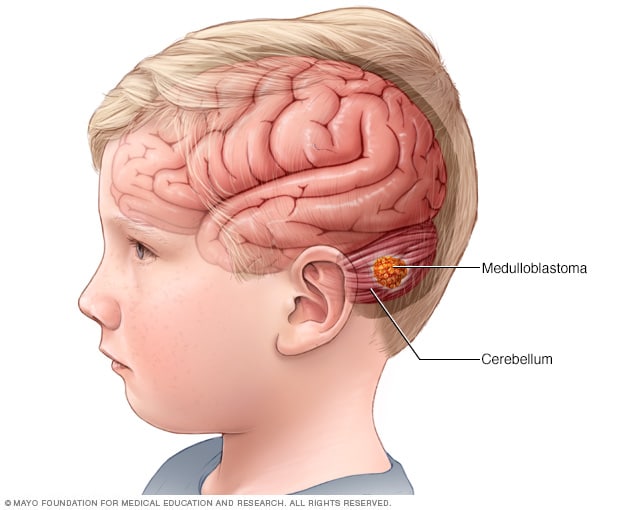If a child has a brain tumor, what are the symptoms?
I wish that children would not get 'brain tumor'. Because after having a brain tumor, the risk is very high for them. One is that the treatment is not easy, the other is less chance of recovery.
I have a complaint to God, why send a child with such a tumor at birth?
However, contrary to our wishes, there are many cases of tumor in children. Especially this problem has come from birth. Why is this happening? It cannot be answered exactly. Because there have been countless researches on cancer so far. However, such a great achievement has not been achieved.
Usually, the most common cause of tumor is a malfunction of Jin. Why is gin bad? The exact reason for this has not been discovered. However, there is a problem when Jin does not develop as it should in general. Gin also has its own 'coding'. Sometimes abnormal cells develop due to mismatched coding. The same cell can grow and become a tumor. And, it can take the form of cancer.
Another thing is that it is said that such a disease is passed on to one's generation by inheritance. But, if that is the case, one person has four children. Only four people do not have tumors. Maybe in one person. Why not the other three?
There is no single concrete reason or answer for this tumor to develop and become cancer. Various things may have influenced it. First a tumor was visible. Now different sub-types (sub-types) of the same started appearing. Some are cured by the same treatment, some are not.
Increased risk of tumors in children
A child's brain tumor is more risky than an adult's. There are many reasons for this. On the one hand, the child cannot express what is happening to him. The child does not say that the head is aching, the eyes are getting weak, and the hearing ability is decreasing.
If there is a child under the age of one year, the speech will not come at all. Other children also do not get the melomeso to express the bad changes that are happening in their body. That is why when they are brought to the hospital, the problem becomes complicated. The tumor has grown.
Small head, big tumor. Complex treatment, weak body. It is difficult for the child's body to tolerate tumor surgery. Again, what has been seen so far is that the tumor on the child's head is in a very awkward place. Basically three types of tumors are seen in them, which are very bad tumors.
Now the tumor is surgically removed. However, if cancer has already occurred, further treatment is uncomfortable. It is difficult to give them chemotherapy, even radiotherapy.
Are there any symptoms of brain tumor in children?
All diseases have symptoms, but how many are known, and how many are not known. Similarly, some symptoms are compatible with other diseases. So the symptoms can sometimes be confusing.
If there is any problem in the brain or the brain, the child cannot hold its head up. We keep the head upright on the strength of the neck and turn it around. However, if there is a problem in the brain, the head can be tilted. Slowly the throat can't take it. Children become weak and small.
Likewise, the child's head may grow. We don't pay much attention to how a small child's head is growing. If it is growing unnaturally, there may be a problem.
Similarly, another clear symptom is that the baby's palate is open when it is small. It is sticky or flexible. It should be covered later. Generally, the palate should start covering when the baby is three months old, and the rostrum should be completely covered by one-and-a-half years. If an infant's palate does not cover or remains open, it should be suspected that they have a head problem. Initiatives should be taken for testing and treatment.
It is important for parents to be aware of whether their child is normal or not. Why are they crying? Why are they not accepting to eat milk? Why are they not seen as normal?
What is the treatment?
Abroad, especially in developed countries, the health of the baby is checked during pregnancy. It is also seen in the mother's womb whether there is a tumor or not. If there is a tumor, what kind is it? The first or second stage tumors can be treated with surgery. Therefore, the baby's tumor is surgically removed while remaining in the mother's womb. However, if it has reached the third and fourth stage, the doctor gives advice to the parents to avoid giving birth to the baby.
However, we do not have such technology or system. Therefore, some diseases are detected only after birth. That too only after the symptoms started to appear. By the time symptoms begin to appear, treatment may be too late.
Let's say we have a brain tumor in an infant or child, the treatment is very uncomfortable and risky. It cannot be said that good results will come even after treatment.
Then what to do to prevent such a problem in the child? There is no exact answer to this either. We have also mentioned above that, despite many research studies, the root cause of cancer has not been found. However, risk factors can be reduced.
For example, if the mother smokes cigarettes, drinks alcohol, or takes drugs during pregnancy, it seems that such problems are more common in their children. So you should stay away from these things as much as possible during pregnancy. Also, is the baby or child growing naturally, growing or not? Parents should take careful care of this. Any abnormal situation in the child should be immediately alerted.









